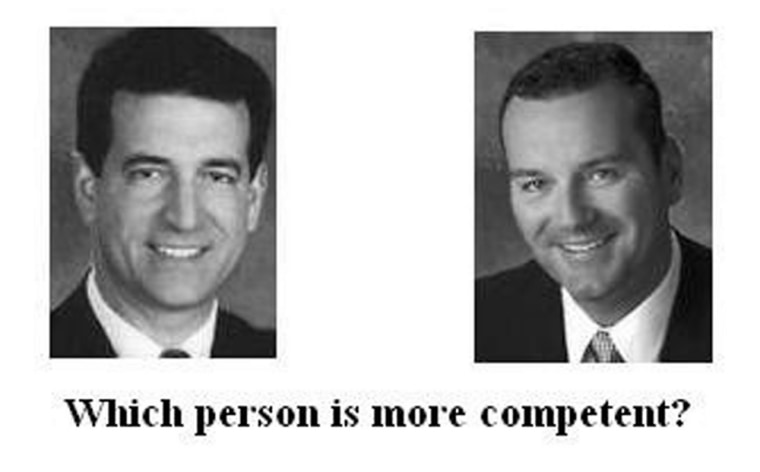Babyface is ideal for cooing infants, or as a nickname for singer-songwriter-producer Kenny Edmonds. In politicians, though, it’s often a losing look.
Scientists have found that voters frequently pick the candidates with more mature looks, exuding competence, over those who have certain features: round face, big eyes, small nose, high forehead, small chin — in other words, a babyface.
Every election, campaigns spend millions on advertising that features photographs of smiling candidates. A study in Friday’s issue of the journal Science suggests that if the politician has cheeks worth pinching, the effort may be a lost cause.
“We show that inferences of competence, based solely on the facial appearance of political candidates and with no prior knowledge about the person, predict the outcomes of elections for the U.S. Congress,” the scientists wrote.
First impressions
They found that a quick look at a candidate’s photograph — a one-second exposure — created an initial impression that often lasted through the more deliberative process that helps a voter decide.
Competence was an overriding trait, and the politician perceived that way, even based only on looks, left a lasting impression.
Psychologist Alexander Todorov of Princeton University had volunteers look at black-and-white photographs of House and Senate winners and losers from elections in 2000 and 2002, and the competing candidates prior to the 2004 contests. The faces had to be unknown to the participants; images of Sens. Hillary Rodham Clinton, D-N.Y., John McCain, R-Ariz., and John Kerry, D-Mass., for example, were immediately eliminated.
“It was just on facial appearance, it could not be influenced by any other information,” Todorov said in an interview.
The study found that the candidate perceived as more competent was the winner in 72 percent of the Senate races and 67 percent of the House races.
Specific example for well-known politicians
In one example, participants in the study looked at photographs of Sen. Russell Feingold, D-Wis., and his Republican challenger in 2004, Tim Michels.
Viewers considered Feingold’s face more mature; their initial impression of Michels was babyface. Last November, Feingold won re-election with 55 percent of the vote to 44 percent for Michels.
“Inferences of competence not only predicted the winner but also were linearly related to the margin of victory,” the scientists wrote.
In an analysis of the study, Leslie A. Zebrowitz of Brandeis University and Emerson College’s Joann M. Montepare said the perception extended to all demographic groups and even affected well-known politicians.
When images of former Presidents Reagan and Kennedy were altered to give them more baby-like features, “their perceived dominance, strength and cunning decreased significantly.”
Zebrowitz and Montepare added: “Although we like to believe that we don’t ’judge a book by its cover,’ superficial appearance qualities such as babyfacedness profoundly affect human behavior in the blink of an eye.”
All is not necessarily lost for candidates who might be judged more babyfaced than their opponents. Presidential hopefuls Bill Clinton and George W. Bush weren’t exactly craggy Abe Lincoln types.
The character issue
So what’s a politician with a babyface to do?
The optimum strategy is to argue that the campaign is less about experience and more about character, said David Eichenbaum, a political media consultant.
“Play to strengths, assume you have a babyface with character. Experience can end up being a bad thing. You have to work to get beyond the superficiality,” he said.
With the time remaining after that initial impression, “‘Babyfaced’ has to seem confident and self-assured. Otherwise it plays into fears of someone too young and not ready for the big time,” he said.
